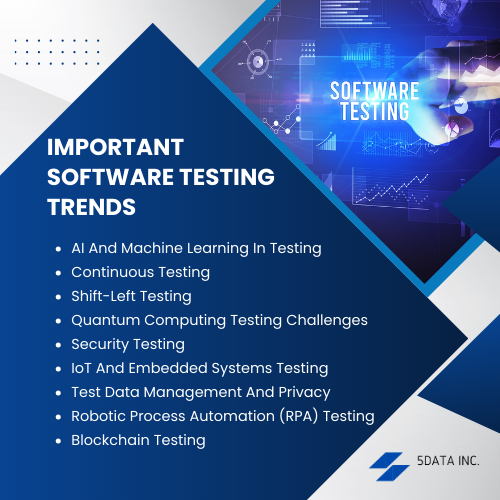Software testing is a part of the software development life cycle and ensures software quality and performance as expected. As technology evolves rapidly, software testing methodologies and practices must adapt to keep up with the changing landscape.
In 2024, we anticipate several emerging technologies shaping how software is tested and validated. These trends reflect advancements in artificial intelligence technology, development methodologies, and the increasing importance of quality assurance in an ever-connected world.
A good functional testing service, including automated functional testing service, ensures quality assurance and verifies the functionality of software applications by confirming that application features work as per the software requirements, delivering reliable and error-free software.
In this blog post, we will dive deep into the advanced technologies of the software testing world and how automated testing tools cater to the needs of the software development process smoothly to develop quality software with new features in mobile apps, cloud computing, web applications, and other diverse fields.
What we cover in this blog
Emerging Software Testing Trends
Let us explore how the upcoming top software testing trends have outgrown manual testing and set new industry standards in the software testing industry.AI and Machine Learning in Testing
- Artificial intelligence and machine learning have made inroads in software testing recently. In 2024 these technologies will become even more deeply integrated into the testing process. AI and ML can automate test cases and test scripts generation, optimize test coverage, and identify patterns in test results that might be challenging for human testers to detect.
- For instance, AI-driven test automation tools can adapt to software user interface changes, making them more robust and reducing maintenance efforts. Additionally, ML algorithms can analyze historical test data to predict which parts of the application are more likely to have defects, enabling more focused testing efforts.
Continuous Testing
- Continuous testing is not new, but its adoption is expected to grow in 2024. Testing must keep pace as organizations embrace DevOps and continuous integration/delivery (CI/CD) practices. Continuous testing involves the automation of tests throughout the development pipeline, from code check-in to deployment.
- Continuous testing helps identify issues early in the development process, reducing the cost and time required for bug fixing. It also provides continuous feedback to developers, enabling them to make immediate adjustments. This trend will further blur the lines between development and testing teams, emphasizing collaboration and automation.
Shift-Left Testing
- Shift-left testing is another trend that will gain prominence in 2024. This approach involves moving testing activities earlier in the development cycle, ideally to the point of code writing. Developers are encouraged to write unit tests and perform code reviews with a testing mindset.
- By catching defects and issues at their source, shift-left testing reduces the likelihood of critical bugs making their way into later stages of development. It saves time and resources and fosters a quality culture within development teams.
Quantum Computing Testing Challenges
- As quantum computing technology advances, software developers and testers face new challenges. Quantum computers can solve complex problems faster than classical computers. However, they also introduce unique challenges in terms of software testing.
- Quantum software must be thoroughly tested to ensure its correctness and reliability. Traditional testing approaches may not suffice for quantum applications. Testers must develop new strategies and tools to verify the behavior of quantum algorithms and quantum hardware.
Security Testing
- Cybersecurity threats continue to evolve, and in 2024, software security testing will be more critical than ever. The attack surface for potential security breaches expands as software becomes more interconnected and reliant on external services and APIs.
- Security testing will not only focus on identifying security vulnerabilities but also on testing the resilience of software against various attack vectors. Ethical hacking and penetration testing will remain essential to security testing, helping organizations identify and remediate weaknesses before malicious actors can exploit them.
IoT and Embedded Systems Testing
- The Internet of Things (IoT) market persistently expands, with more devices becoming interconnected. Testing these devices and the embedded software that powers them presents unique challenges. 2024, we expect to see a greater emphasis on IoT and embedded systems testing.
- Testers must ensure IoT devices function correctly in diverse environments, communicate securely, and are resilient to disruptions. Additionally, testing for interoperability among different IoT devices and platforms will become increasingly important.

Test Data Management and Privacy
- With the rise of data privacy regulations like CCPA and GDPR, test data management is becoming a significant concern for organizations. In 2024, we will see a heightened focus on ensuring that test data used in software testing complies with privacy regulations.
- Anonymizing or pseudonymizing sensitive data will be essential to protect user privacy while still being effective for testing. Test data generation tools must evolve to provide realistic data without violating privacy regulations.
Robotic Process Automation (RPA) Testing
- Robotic Process Automation (RPA) is gaining traction in various industries as organizations seek to automate repetitive tasks. Testing RPA bots and workflows will become a specialized automated testing area in 2024.
- RPA testing involves validating that bots perform tasks accurately and efficiently and ensuring they can adapt to changing processes. Testers must develop strategies to handle the technical aspects of RPA testing and the business processes they automate.
Blockchain Testing
- Blockchain is not just limited to cryptocurrencies. It’s being adopted in various industries for its security and transparency benefits. Testing blockchain-based applications requires a deep understanding of distributed ledger technology.
- In 2024, as blockchain adoption continues, specialized blockchain testing tools and expertise will be in high demand. Testers will focus on validating the integrity of transactions, smart contracts, and consensus mechanisms.
Virtual Reality (VR) and Augmented Reality (AR) Testing Methodology
- AR and VR applications are becoming increasingly popular in gaming, education, and various industries. Testing these immersive experiences involves verifying not only the functionality but also the user experience.
- In 2024, software testers must adapt to AR and VR testing, ensuring that these applications are free from glitches, motion sickness-inducing problems, and compatibility issues with different hardware devices.
Environmental Testing and Sustainability
- As environmental concerns become more pronounced, organizations are looking to reduce the carbon footprint of their software. In 2024, expect to see the emergence of environmental testing as a crucial aspect to ensure software quality.
- Testers will assess software applications’ energy consumption, resource utilization, and environmental impact. Tools and frameworks will be developed to measure and optimize the sustainability of software throughout its lifecycle.
Conclusion
In conclusion, the software testing landscape in 2024 will be shaped by various factors, including technological growth, evolving development methodologies, software development lifecycle, and the increasing need for quality assurance in a rapidly changing digital world. As these emerging trends take center stage, software testers, and quality assurance professionals must adapt, upskill, and embrace new tools and methodologies to ensure that software systems meet the highest quality, security, and performance standards. Whether it’s harnessing the power of AI and machine learning, addressing the challenges of quantum computing, or ensuring software sustainability, software testing remains critical in delivering reliable and resilient digital solutions.
About the Author...
Amulya Sukrutha is a passionate computer science engineer specializing in the Data science field. She also describes herself as an enthusiastic strength and endurance trainee. She played professional tennis during her early years and found her path in Software development and machine learning later. She is also passionate about creating content and learning about new technologies.
